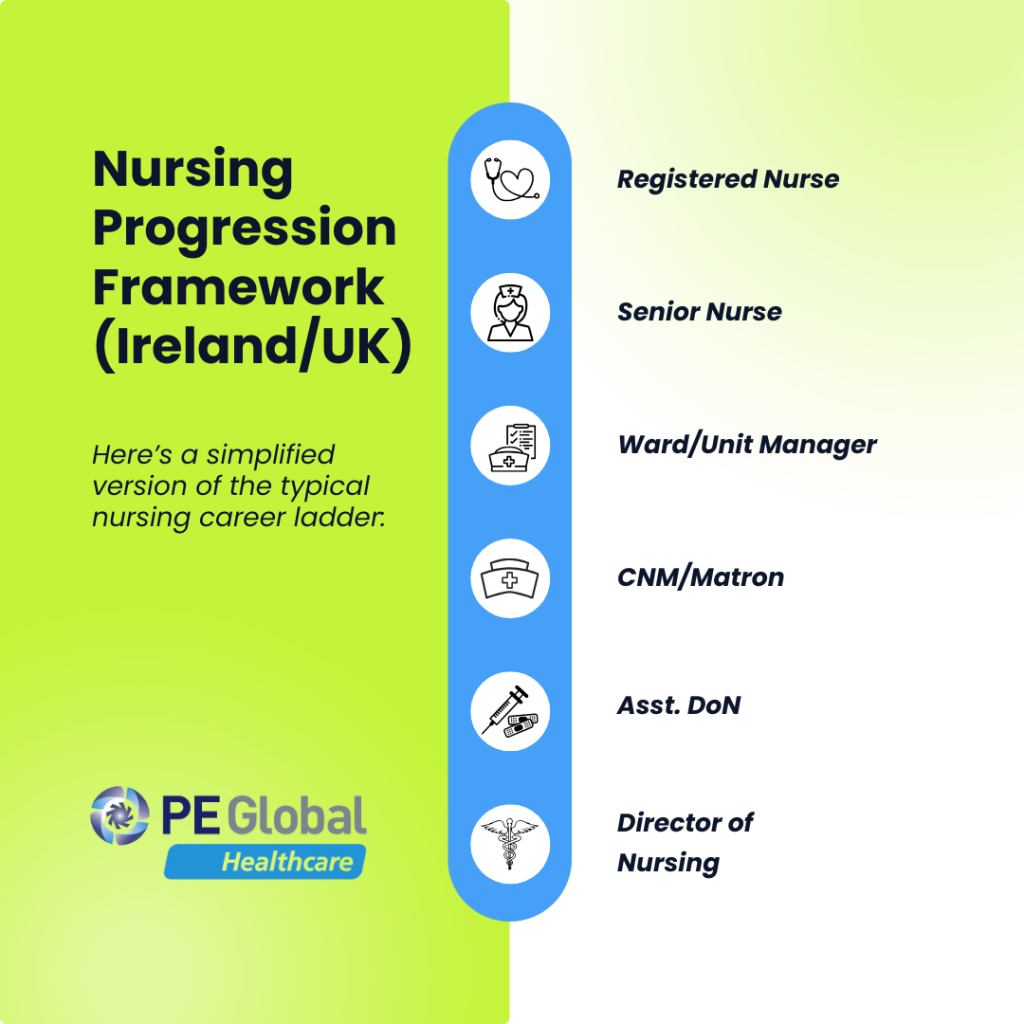The journey from Registered Nurse (RN) to Director of Nursing (DoN) is a significant one, marked by clinical excellence, lifelong learning, and strategic leadership. For those in the nursing profession who aspire to shape healthcare at a systems level, the role of DoN offers the chance to influence policy, mentor teams, and drive improvements in patient care.
Whether you’re early in your nursing career or eyeing the next step, this guide breaks down the journey, outlining qualifications, experience, and essential leadership skills to reach one of the top positions in the nursing field in the UK and Ireland.
Experience in mentorship, audits, change projects, or committee roles will also stand out on your CV.
What Does a Director of Nursing Do?
The Director of Nursing is responsible for the overall nursing strategy and standards within a hospital or healthcare organisation. Typical responsibilities include:
- Strategic oversight of all nursing services
- Policy development and implementation
- Team management and workforce planning
- Clinical governance and quality improvement
- Budget and resource management
- Representation of nursing interests at the executive level
In Ireland, this role may align with the titles of Director of Nursing or Assistant Director of Nursing, whereas in the UK, equivalents include Chief Nurse, Head of Nursing, or Matron, depending on the trust or care setting.
Step 1: Entry-Level Requirements. Becoming a Registered Nurse
To begin the journey:
In Ireland:
- Complete a BSc in Nursing from an NMBI-approved institution.
- Register with the Nursing and Midwifery Board of Ireland (NMBI).
In the UK:
- Complete a BSc (Hons) in Adult, Child, Mental Health, or Learning Disability Nursing.
- Register with the Nursing and Midwifery Council (NMC).
Following registration, gaining diverse experience in acute or community settings helps to build a solid clinical foundation.
Step 2: Gaining Clinical Experience
Career progression relies on deep clinical expertise. Many DoNs have worked their way up through:
- Staff Nurse
- Senior Staff Nurse or Team Leader
- Ward Manager / Sister / Charge Nurse
- Clinical Nurse Manager (CNM)
- Assistant Director of Nursing / Head of Nursing
- Director of Nursing
Depending on the organisation, a typical journey to DoN can span 10 – 15 years of experience. Leadership and mentorship opportunities should be sought along the way.

Step 3: Postgraduate Education and Certifications
Progression to senior leadership roles often requires postgraduate qualifications:
- MSc in Nursing Leadership / Management
- MSc in Healthcare Administration
- Postgraduate Diploma in Leadership or Quality in Healthcare
- Optional: PhD or Doctorate in Nursing Practice (DNP)
Certifications and leadership programmes to consider:
- RCN Leadership Programmes (UK)
- HSE Leadership Development Programmes (Ireland)
- Project Management or Lean Six Sigma Training
Step 4: Building Leadership Skills
Leadership in nursing is as much about people as processes. Aspiring DoNs must cultivate:
- Strategic Thinking: Ability to set and deliver long-term goals
- Communication: Managing teams, resolving conflict, and engaging stakeholders
- Change Management: Leading service reconfigurations or quality improvement initiatives
- Financial Acumen: Managing large budgets and resources effectively
- Emotional Intelligence: Supporting and inspiring staff through challenges
Experience in mentorship, audits, change projects, or committee roles will also stand out on your CV.
Step 5: Networking and Mentorship
Building a strong professional network is invaluable:
- Join professional bodies such as:
- Irish Nurses and Midwives Organisation (INMO)
- Royal College of Nursing (RCN)
- Attend healthcare conferences and workshops
- Find a mentor already working in a senior role
- Subscribe to nursing leadership journals and publications
Step 6: Applying for a Director of Nursing Role
When you’re ready to apply for a DoN position, focus on:
- Tailored CV that highlights leadership achievements, team initiatives, and patient safety outcomes
- Strong references from executive nursing or medical staff
- Clear personal statement outlining your vision for nursing leadership
- Prepare for panel interviews that focus on:
- Scenario-based leadership questions
- Strategic thinking
- Your philosophy on patient care and staff development
Challenges and Rewards
Challenges:
- High levels of responsibility
- Navigating health service politics
- Balancing strategic vision with on-the-ground demands
Rewards:
- Shaping national or organisational healthcare policy
- Creating lasting improvements in patient care
- Empowering and developing the next generation of nursing leaders
Conclusion
Becoming a Director of Nursing is a goal within reach for ambitious, compassionate and forward-thinking nurses. By combining experience, education, and leadership development, the path from ward to boardroom is clearly defined, though it requires commitment, resilience and vision.
At PE Global Healthcare, we regularly place healthcare professionals into leadership positions across Ireland and the UK. If you’re ready to take the next step in your nursing career, explore our current opportunities or upload your CV to get started.
